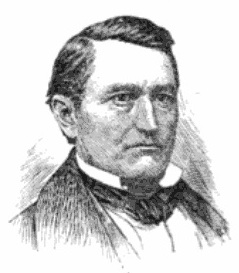Junius Hillyer to Howell Cobb..
Washington [D. C], Jan. 30th, 1861.
Dear Sir: I wish you would take a few moments of your time to drop me a line. Things here are not working right. Since the Southern men have left Washington there seems to be nobody standing up for the Southern movement, and the pressure in favour of the Union is so strong as to silence all opposition. This state of things may be unimportant as to the States that have seceded but it is producing a most melancholy effect in the border States. In fact you may prepare your mind for a defeat in Virginia and all the rest of the border States. But that is not all that I dread. It is proper that occupying the position you do, you should be informed of the worst signs of the times. My fear is that we are in danger of meeting not only the opposition of the border States, but their hostility.
You may give more credence to the strong language of Phil Clayton than you do to what I say. He speaks as he feels; I speak as I see and observe. And I tell you, I warn our friends at Montgomery that unless you proceed with the greatest caution you will have the border slave States strongly bound with our foes against us and making common cause with them to conquer a settlement. That there is danger of this is just as true as we live. The great prolific source of danger is upon three subjects mainly. The idea is extensively abroad that the manufacturing interest of Va. is in danger and that the navigation of the Mississippi will be obstructed and that the slave trade will be reopened. I don’t understand the question of the tariff in its details, but if you establish free trade we are certain to lose Va. and Md. The navigation of the Mississippi up and down is important to the States on that river and its tributaries and unless this navigation is properly provided for we will lose Ark., Tenn., Ken., and Mo. I have no fear about the slave trade. .But I tell you, Gov[ernor], we must raise revenue from a judicious tariff. This is what our people are accustomed to. And it is desirable that our revolution should be attended with as slight a jar as possible to the habits of our people. You have need of all your wisdom and forecast.
I hope I shall be at home in time to vote for you for President. If the election should come on before the 4th Mar., as it ought, I will come home to vote. . . . Old Buck and his Cabinet are trying honestly in their bungling way to have a peaceful solution in some way of this matter. I honour him for it and am willing, so long as the country remains at peace, to continue with his administration.[i] Write to me and give me your views about this course on my part. I hope you will be elected President and that I may be the Solicitor of the Treas. I could start that bureau on a proper plan and make it efficient.
P. S.—One word more. There is such a likeness between your intellect and mine that I know that you will concur with me—that we ought to keep in view the good old Democratic doctrine of “a tariff for revenue, with incidental protection.”
From what I learn the Border Congress that meets here on the 4th will break down. Nothing will be done. And now everything depends upon the wisdom, justice and moderation, at Montgomery. Let such action be had as will inspire confidence in the border slave States and will induce them to cast their destinies with us. Write to me.
[i] Hillyer continued to hold office as Solicitor of the United States Treasury until Feb. 13, 1861, when he resigned.
From Annual Report of the American Historical Association for the Year 1911.
Junius Hillyer (April 23, 1807 – June 21, 1886) was an American lawyer, judge, and politician who served two terms in the United States Congress. After his congressional career, Hillyer was appointed by President James Buchanan as Solicitor of the United States Treasury, and served from 1857 until February 13, 1861 when, as a result of Georgia’s seccession from the Union, he resigned his post and returned to Georgia. This marked the end of Hillyer’s career in public service. For his remaining years he concentrated on the private law practice.
Howell Cobb was an American political figure. A southern Democrat, Cobb was a five-term member of the United States House of Representatives and Speaker of the House from 1849 to 1851. He also served as the 40th Governor of Georgia and as a Secretary of the Treasury under President James Buchanan. Cobb is, however, probably best known as one of the founders of the Confederacy, having served as the President of the Provisional Congress of the Confederate States.
